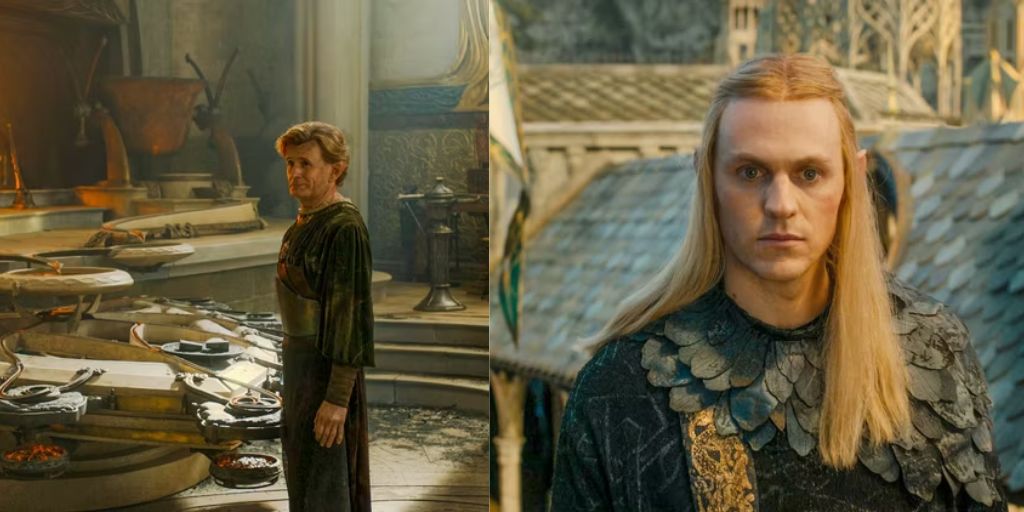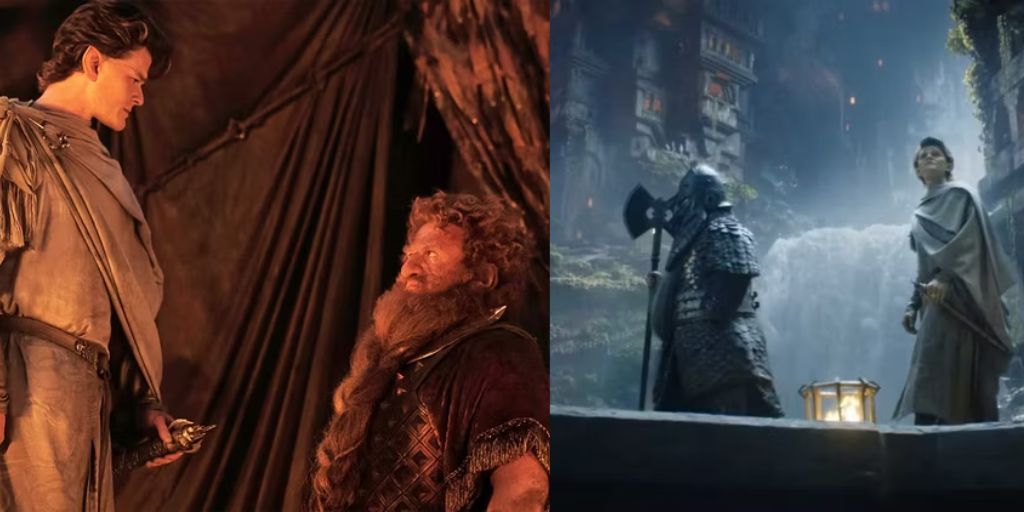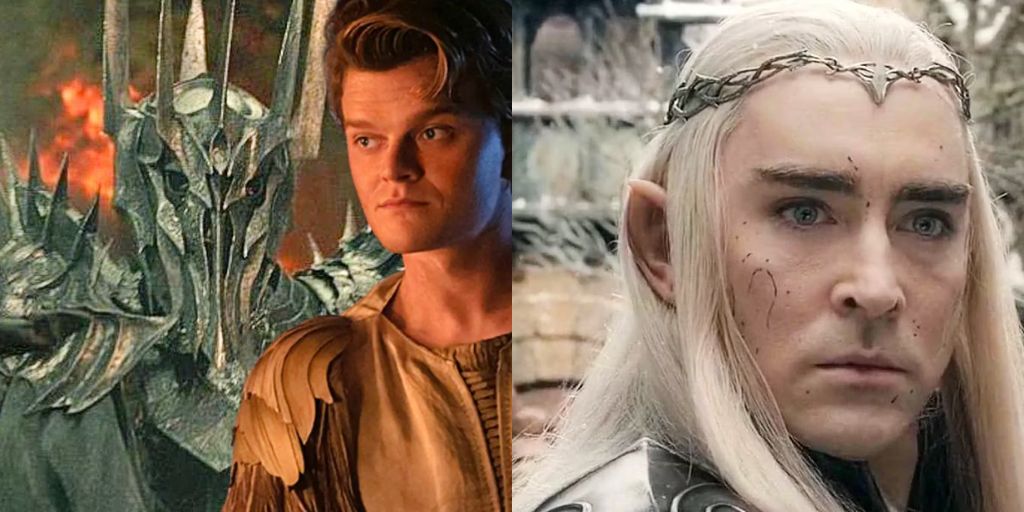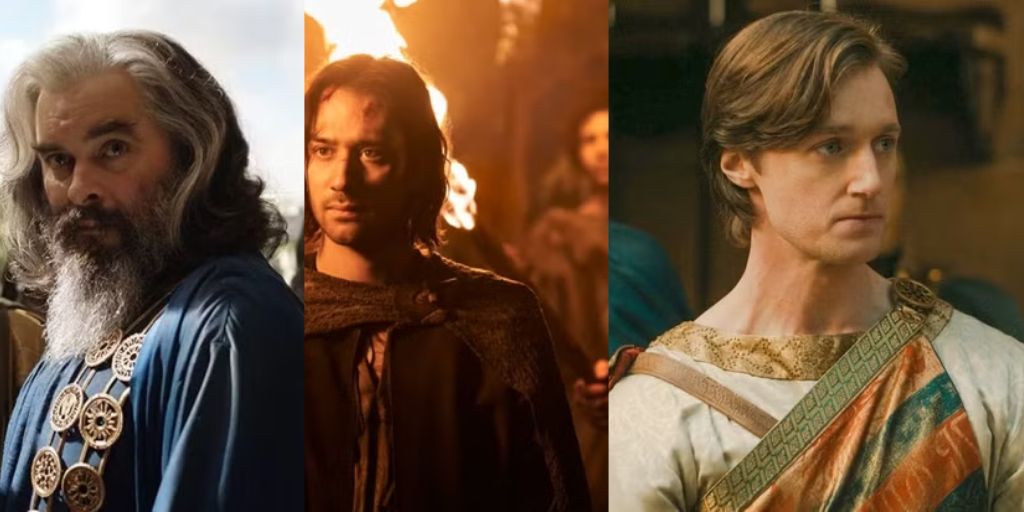The Lord of the Rings: Rings of Power has created its own story and kept its identity while still respecting J.R.R. Tolkien’s legend at every turn. The Amazon Prime Video series covers a lot of ground, focusing on the Second Age, the time when the 19 Rings of Power were forged.
In this age, all living in Middle-earth face an uncertain fate as an ancient evil attempts to rise again. Though darkness seeks to rule and unexpected heroes challenge it, the battle is not always a simple matter of good versus evil.
Characters in Rings of Power—whether powerful or ordinary—struggle between light and darkness. Often, they must face the darkness to find the light, and some encounter it more than others. Some live in the light but feel drawn to the dark side.
Although Sauron has not yet created the One Ring, if he forged it in Mount Doom during this chaotic period, it would tempt many characters, as the Ring can corrupt instantly. Several characters in the series would find it hard to resist the Ring’s power if they held it.
Gil-galad
In Season 1 of Rings of Power, High-King Gil-galad (played by Ben Walker) faces a serious problem. The Great Tree of Lindon is dying, and the light of the Elves is fading. He believes Galadriel (played by Morfydd Clark) is somehow connected to this darkness, so he sends her away.
When that doesn’t work, he relies on Elrond’s (played by Robert Aramayo) friendship with Prince Durin (played by Owain Arthur) to find out if the Dwarves have discovered Mithril, a rare ore with the light of the last Silmaril, which might stop the darkness threatening the Elves.
With little time left, Gil-galad allows Celebrimbor (played by Charles Edwards) to make three Elven Rings of Power.
Despite knowing that Sauron (in the form of Halbrand, played by Charlie Vickers) helped create these rings, Gil-galad claims they are the only hope and wears one alongside Galadriel and Círdan (played by Ben Daniels).
This ring gives Gil-galad visions of the future, and he prepares for war after realizing Celebrimbor faces danger in Eregion.
The One Ring could easily corrupt Gil-galad because darkness and deception have already affected his heart. His actions in Season 1 show how a person can justify doing wrong to achieve a greater good. He uses Elrond to gain access to the Dwarves but only wants the ore to help his people.
A darker part of him convinces him that his actions are justifiable, but this also makes him more likely to deceive again. Unlike Elrond, Gil-galad does not hesitate to use the three Elven Rings of Power, which could signal that he is open to using powerful objects despite the risks.

Eärien
Eärien (played by Ema Horvath), the daughter of Elendil (played by Lloyd Owen) and sister of Isildur (played by Maxim Baldry), is ambitious and strong-minded but also desires acceptance and love.
She acts as a confidante for her brother as he searches for his purpose but finds her own path as an apprentice with the Builder’s Guild.
She meets Kemen (played by Leon Wadham), the son of Pharazôn (played by Trystan Gravelle), and urges him to prevent Queen Regent Míriel’s (played by Cynthia Addai-Robinson) expedition to Middle-earth. Though unsuccessful, Eärien discovers something unexpected.
While drawing the dying king, she sees Míriel’s palantir and looks into it. Attracted by Pharazôn’s growing influence, she joins him and gives him access to overthrow Míriel.
Darkness surrounds Eärien’s choices. In Season 1, she uses Kemen’s affection for her to try to halt the expedition. By Season 2, she becomes an opportunist, using Kemen and her knowledge of the palantir to gain a position in court.
When she believes Isildur has died, she uses the palantir to her advantage, essentially giving Pharazôn a tool to overthrow Míriel.
Eärien believes she is protecting Númenór from a queen who supports the Elves, but her actions are actually selfish and fueled by revenge.
Pharazôn takes advantage of her easily, and if she encountered the One Ring, she might convince herself it was best for her to use it for the greater good.
The Stranger
The Stranger (played by Daniel Weyman) falls from the sky, landing near the Harfoot camp. Nori (played by Markella Kavenagh) finds and helps him since he has no memory but wields great power that he struggles to control. In return, he protects Nori and her family.
However, after nearly hurting her, he leaves. Nori later risks her life to help him when the Mystics capture him.
After he destroys the Mystics, he begins to regain his memories. On a journey to Rhûn, he and Nori face many dangers, including near-death experiences.
Following his star map, the Stranger eventually meets Tom Bombadil (played by Rory Kinnear), who tells him he alone can defeat Sauron and the Dark Wizard. Now, the future of Middle-earth depends on his choices.
The Stranger is vulnerable and innocent, much like a child. He has no memory of who he is or where he came from.
At first, he only recalls a star pattern that might help him find his identity. When the Mystics arrive, he is willing to believe their claim that he is Sauron because he doesn’t know otherwise.
His innocence makes him open to darkness. If the Mystics had found him first instead of Nori, he might have become a Dark Wizard.
In Season 2, he learns he is an Istar and begins to understand the responsibilities of power. However, the Ring could easily corrupt him without him realizing, especially because his bond with Nori is the only thing keeping him from the darkness.

Theo
Theo (played by Tyroe Muhafidin), the teenage son of Tirharad’s healer Bronwyn (played by Nazanin Boniadi), is determined to protect his home, even willing to shed blood to activate a sword hilt bearing Sauron’s sigil. He believes the sword will keep him safe, and it does, but it also binds him to its power.
Waldreg learns Theo used the sword hilt and tries to bring him into Adar’s (played by Joseph Mawle and Sam Hazeldine) forces, but Theo chooses to stay with his mother, Bronwyn, and Arondir (played by Ismael Cruz Córdova).
Later, in a battle, Theo reveals the hilt’s location to save his mother. After his mother’s death, Theo takes her place as healer in Pelargir.
Theo has already fallen under the influence of another powerful object created by Sauron—the sword hilt.
The Ring would undoubtedly draw him in as it did Boromir, with the need to claim its power. Even if his intentions are honorable, Theo would likely become enthralled by the Ring’s strength.
Adar
Adar, known as “father” in Sindarin, is the revered leader of the orcs who terrorize the Southlands. As his followers prepare to trigger the eruption of Orodruin, Adar offers the Southlanders a choice: join him or perish. He goes to war against those who refuse and demands the sword hilt.
During the battle, Waldreg uses the hilt to release a flood that causes Mount Doom to erupt. Adar and his orcs create Mordor and continue enslaving humans until Sauron (as Halbrand) shows up. Adar rallies his forces and heads to Eregion to confront Sauron, not realizing that Sauron wants this outcome.
Adar constantly craves more power but once had very little of it. When Sauron ruled him, he was quickly deceived by empty promises.
If he possessed the One Ring, he would use it for what he believes to be honorable reasons—to protect his people. However, his love for them would fade, and selfishness would eventually take over, amplifying his evil.
King Durin III
King Durin III (played by Peter Mullan), father of Prince Durin IV, rules with a commitment to traditional Dwarven values. He aims to keep Khazad-dûm’s riches hidden and reserved for his people.
After Disa (played by Sophia Nomvete) finds Mithril, he allows mining but stops it after a shaft collapses. When he learns that the ore could save the Elves, he refuses to help, fearing it would risk Dwarven lives.
His son, however, begins mining with Elrond, leading to a major argument. After the collapse of Khazad-dûm’s sun shafts, Prince Durin asks his father to allow Mithril to be used for making Dwarven Rings of Power, hoping they can help.
Once the king wears a ring, it heightens his greed, causing him to become increasingly ruthless, seeing enemies even among family.
King Durin’s actions show his self-centeredness and greed, particularly when he tries to keep Mithril from the Elves. Once he puts on a Dwarven Ring, his desire for wealth grows.
He views the Dwarven Rings as a source of riches and begins to value wealth over his own family. If he wore the One Ring, it would fully corrupt him, making him even more consumed by power.

Celebrimbor
Celebrimbor, one of the most skilled Elven smiths, dreams of creating something even more impressive than the Silmarils crafted by Fëanor.
He seeks a legacy that will last, and he’s willing to sacrifice anything to achieve it. High King Gil-galad gives him the task of making something from Mithril, a powerful metal.
When Halbrand (Sauron in disguise) offers him advice on how to use Mithril, Celebrimbor accepts it and makes three Elven Rings of Power.
Although Galadriel warns him against Halbrand, Celebrimbor cannot resist knowing if his work succeeded and allows Halbrand into Eregion.
Sauron, posing as a messenger of the Valar, persuades Celebrimbor to make Rings for Dwarves and Men. Then, Sauron traps Celebrimbor in an illusion, convincing him that the choice to make the Rings was all his own.
Celebrimbor’s desire for greatness blinds him to Sauron’s manipulation. He yearns to prove himself and accepts Sauron’s guidance, even though he senses something is wrong.
Sauron’s influence leads Celebrimbor to forge the Rings for Men and Dwarves, which helps him fulfill his ambition but leaves him vulnerable to darkness.
If he encountered the One Ring, it would completely consume him, feeding on his pride and ambition. The Ring would give him promises of greatness, making him powerless against its allure.
Kemen
Kemen, son of Pharazôn, seeks his father’s approval and respect. When Queen Regent Míriel decides to send aid to the Southlands, Kemen feels conflicted by Pharazôn’s support.
His friend Eärien convinces him to use his influence to stop the mission. Failing to do so, he tries to sabotage it on his own.
Later, after Pharazôn seizes the Númenórean throne, Kemen suggests rebuilding Númenór to gain his father’s approval, but Pharazôn wants more.
To test his loyalty, Pharazôn orders Kemen to dismantle the Queen’s Sea Guard and destroy the Faithful’s temple. When challenged by Valendil, Kemen resorts to killing him in cold blood.
Kemen’s need for his father’s approval and his willingness to betray others leave him vulnerable to darkness. His actions reveal a desperation for recognition, and he loses his moral compass along the way.
If he held the One Ring, its power would tempt him with promises of honor and greatness, feeding his ambition. Driven by the Ring, he would likely go to any lengths to prove himself, blinded by the chance to earn his father’s respect.
Isildur
Isildur, training to join Númenór’s Sea Guard, lacks purpose despite his father Elendil’s encouragement. He deliberately gets himself dismissed, dragging his friends down with him, and creates a rift with his father. His only chance to regain Elendil’s approval is by joining the expedition to Middle-earth.
Though assigned as a stable sweep, he shows courage in battle, saving others and risking his life in the fight against the Southlands. Later, he meets Estrid, who deceives him, though he remains trusting and eager to bond.
Long-time fans know Isildur’s eventual fate with the One Ring, though in Rings of Power his susceptibility to it is only beginning to show.
His directionlessness makes him open to temptation. If he found the Ring, he would likely see it as a source of purpose and strength rather than a danger. Easily deceived, Isildur would be vulnerable to the Ring’s influence, leading him to believe its promises and fall under its spell.
Pharazôn
Pharazôn, the ambitious cousin of Queen Regent Míriel, initially supports her decisions as Chancellor of Númenór.
But when Míriel decides to send aid to the Southlands, Pharazôn’s true ambitions surface. He views the expedition as a chance for political and economic gain and dislikes the Elves.
After learning about Míriel’s palantir, Pharazôn takes over the throne. Despite reaching the height of power, he still wants more.
Using his son Kemen, Pharazôn seeks to dismantle the Faithful and disband Míriel’s supporters, though Míriel has the protection of the Valar.
Pharazôn’s traits make him an ideal candidate for the Ring’s influence. His manipulation, arrogance, and selfishness would make him eager to take the Ring.
Driven by greed, Pharazôn would view the Ring as a way to attain even more power. He is exactly the type of person the Ring seeks, and it would easily corrupt him, amplifying his ambition and transforming him into an even more dangerous ruler.

In The Rings of Power, each character’s journey reveals how ambition, insecurity, or pride can lead even the most well-meaning individuals into dangerous territory.
The One Ring, Sauron’s ultimate tool of corruption, is designed to exploit these traits, drawing individuals closer to darkness by offering them what they desire most.
Celebrimbor, driven by a need to prove his worth as a creator, makes himself vulnerable by ignoring warnings and bending to Sauron’s influence.
His ambition and pride in his craftsmanship blind him to the true nature of Sauron’s intentions, allowing himself to be manipulated in the pursuit of greatness.
Kemen’s desire to gain his father Pharazôn’s approval similarly leaves him susceptible to corruption, as he willingly betrays his own people and even resorts to violence.
His need for validation would easily compel him to use the Ring’s power to achieve his father’s praise, regardless of the moral cost.
Isildur’s story shows how lack of direction and inner conflict can be just as dangerous as ambition. Feeling purposeless, he could fall under the Ring’s sway as he searches for strength and validation, risking his loyalty and relationships. Pharazôn, however, is perhaps the most prepared to wield the Ring’s corruptive force.
His ambition, arrogance, and relentless pursuit of power align perfectly with the Ring’s ability to amplify the darkest parts of a person’s soul.
For Pharazôn, the Ring would not only fulfill his lust for control but also consume his already morally flawed character. Even those who might resist at first would find themselves facing choices that test their deepest fears and weaknesses.
Through these complex character arcs, The Rings of Power demonstrates that anyone, regardless of their initial intentions, can be corrupted by the allure of power.
This exploration of human (and Elven) nature resonates with Tolkien’s original vision, reminding viewers that true strength comes from resisting temptation and choosing humility over pride, compassion over ambition, and loyalty over self-interest.





